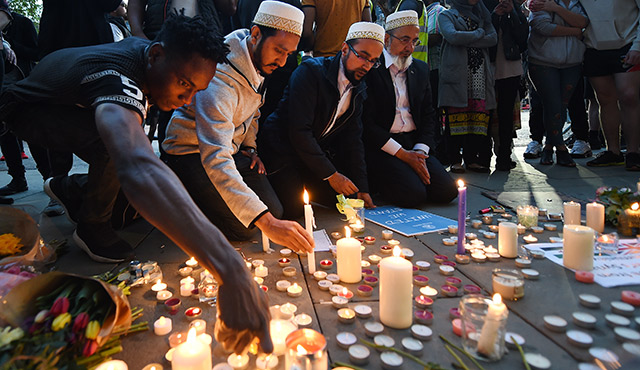Carol Blair’s husband was 43 when he died of a heart attack.
It was a tragic blow to Blair and their six children, who ranged from ages 16 to 11 months old.
“My first question was, ‘God, I thought that you loved me. How can this be good? How can this be a part of your plan?’” Blair says. “I just couldn’t believe that would happen, and I think that’s a universal reaction.”
Tragedy can be a tremendous test of faith for many Catholics, depending on where one’s faith lies and the degree of tragedy, says Michael P. Donaldson, director of the Office of Pastoral Care for Families In All Stages at the Diocese of Orange.
“It can really rock someone’s faith, especially those who are deeply rooted in their relationship with God,” he says.
Reactions can range from “Why did God do this to people or me?” to “There’s something good that’s going to come out of this. I trust that God’s grace was there to protect me.”
“Some folks automatically blame God, or this is the person interfering in God’s will,” Donaldson says. “When we experience the tragedy of death, or something as tragic as what happened in Manchester (the United Kingdom terrorist attack that took place at an Ariana Grande concert), when you’re not expecting something like that, it’s a shock to the system.
“We’re human. People can experience deep sadness or a chaotic experience of mental health with depression.”
Grief is experienced so differently from person to person, Donaldson says.
“It can be a lifelong journey,” he says. “It’s what we do with our grief. Faith does play a role in putting our grief into perspective and that by leaning on our faith and trust in God, we can be great witnesses of that hope as people of the Resurrection, that from tragedy there is great joy that will come to us.”
Having hope in God and being able to go to one’s parish and clergy for relief will be key in helping those dealing with tragedy to move forward, Donaldson says.
“Grief is one of those situations where you come to terms with and trust that God has a purpose for us,” he says.
For Blair, who wrote about her experience in “Faith for the Journey: A Spiritual Memoir,” faith played the greatest role in the early moments of tragedy and has made her belief in her faith stronger.
“For me, that came right away,” she says. “Either there is a God or there is no God. The God I believe in is a loving God and I choose to believe that this is part of His plan, and even though I don’t like it, I had to say to myself, ‘ OK, God knows what he’s doing.’ I let myself dwell on God in this situation with me.”
Blair says her relationship with God did not happen overnight; rather, it had been building over a five-year period prior to her husband’s death. She spoke of one example in which her husband had been laid off. They prayed on the situation and the next day, her husband went back to work for his company and was promoted.
“The first thing for me was to reach out to God, even when I didn’t understand what He was doing,” Blair says.
In those early moments of tragedy, Blair says she remembered Proverbs 3:5-6, which says “Trust in the Lord with all your heart and lean not on your own understanding; in all your ways submit to him, and he will make your paths straight.”
“I have to trust in God,” she says. “I did not know what to do when I walk through that door, but God through his Holy Spirit was going to walk through that door with me. That was the thing I clung to.”
She also pointed to Romans 8:28, which says, “And we know that in all things God works for the good of those who love him, who have been called according to his purpose.”
“Everything works through God, and that’s really hard to believe when you’re going through a tragedy,” she says. “But God allows these things because he is transforming us into the image of His son. God’s purpose for tragedy is that we would go to him immediately and just be at his feet, telling him how we feel and then knowing that somehow, this is going to work for good, forming us into what he wants us to be.”
When Catholics witness others going through tragedy, actions speak louder than words.
“Sometimes in moments of tragedy, it’s the fact that we’re there and that we’re walking with them,” Donaldson says.
Blair says she remembered how her prayer group came to help her after her husband died by sleeping over at her house, helping her with her children, cooking meals and offering comfort.
“It was wonderful, above and beyond anything I ever expected,” she says. “You don’t have to come up with fancy words or give a teaching on death. Just be there.”

